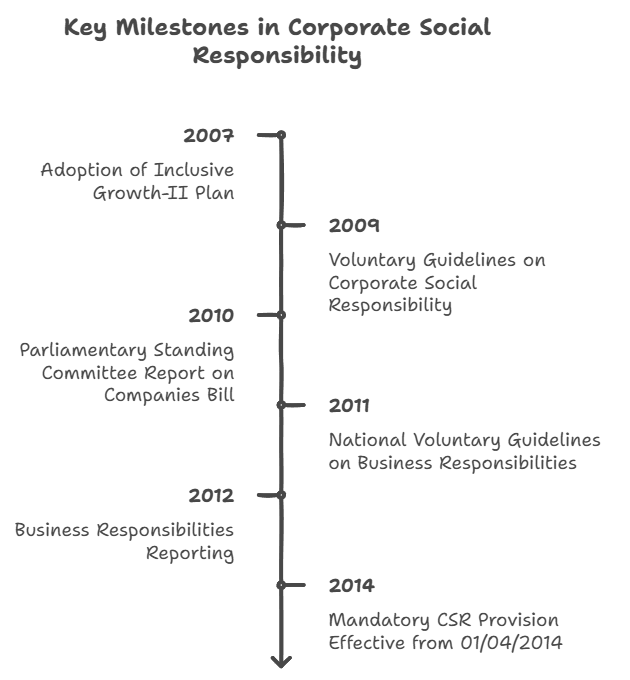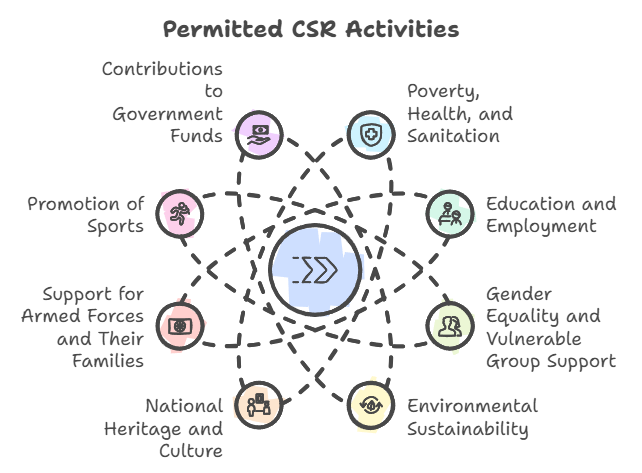Governance
CSR: From Mere Compliance to Impact
- 25 Oct 2024
- 16 min read
This editorial is based on “Why reforms in the CSR ecosystem are needed” which was published in Hindu Business Line on 24/10/2024. The article brings into picture the significant growth in annual CSR investments in India, now at ₹30,000 crore, since the mandate in 2014. However, challenges such as unequal power dynamics, short implementation windows, and reliance on intermediaries impede the achievement of meaningful long-term impact.
For Prelims: Corporate Social Responsibility, Companies Act, 2013, , UN Sustainable Development Goals, Ministry of Corporate Affairs, Poverty reduction, Rural development programs, NGOs, Aspirational Districts.
For Mains: Significance of CSR Activities in India, Major Issues Related to CSR in India.
As India marks a decade since mandating Corporate Social Responsibility through law in 2014, the annual CSR investments have reached a substantial ₹30,000 crore. While the law requires eligible companies to spend 2% of their profits on social causes, the implementation faces several challenges. The unequal power dynamics between corporations and NGOs, short implementation windows, and over-reliance on middleman agencies often hinder meaningful long-term impact.
What is Corporate Social Responsibility?
- About: Corporate Social Responsibility (CSR) is a business model where companies voluntarily integrate social, environmental, and ethical considerations into their operations and interactions with stakeholders.
- CSR aims to make businesses accountable for their impact on society beyond just profit, focusing on sustainable development, community welfare, and ethical practices.
- CSR under the Companies Act, 2013:
- CSR provisions under Section 135 of the Companies Act, 2013, became effective from April 1, 2014.
- These provisions reflect India’s commitment to inclusive growth by mandating corporate contributions towards social, environmental, and human development.
- CSR provisions apply to companies meeting any of the following criteria in the preceding financial year:
- Net worth: More than INR 5 billion.
- Turnover: More than INR 10 billion.
- Net profit: More than INR 50 million.
- Such companies must spend a minimum of 2% of their net profit over the last 3 years on CSR activities.
- Origins and Development of CSR Guidelines:
- The Ministry of Corporate Affairs (MCA) initiated CSR concepts with the Voluntary Guidelines on Corporate Social Responsibility, 2009, aiming to mainstream responsible business practices.
- These guidelines evolved into the National Voluntary Guidelines (NVGs) on Social, Environmental, and Economic Responsibilities of Business, 2011, which outlined key principles for corporate responsibility.
- In March 2019, the NVGs were updated to the National Guidelines on Responsible Business Conduct (NGRBC), incorporating international standards, such as the UN Guiding Principles on Business & Human Rights (UNGPs), UN Sustainable Development Goals (SDGs), and the Paris Agreement.
What is the Significance of CSR Activities in India?
- Poverty Alleviation and Rural Development: CSR initiatives are instrumental in supporting poverty reduction and rural development programs, often focusing on education, healthcare, and infrastructure.
- For instance, more than ₹12,300 crores were spent on rural development projects, directly impacting poverty-stricken communities.
- Improvement in Public Healthcare: With healthcare infrastructure still developing in rural and semi-urban areas, CSR activities significantly bridge gaps by funding hospitals, mobile clinics, and health awareness programs.
- Companies like Reliance and Infosys have contributed substantially to Covid-19 relief efforts, establishing oxygen plants and funding vaccinations across India.
- Spending on health in FY22 stood at ₹7731 crore underscoring the sector’s priority for CSR funding
- Environmental Sustainability and Climate Action: CSR initiatives focus on sustainability efforts, including afforestation, water conservation, and clean energy projects.
- ITC Limited’s ‘Mission Sunehra Kal’ works on water conservation, benefiting millions of people in water-stressed areas.
- In FY22, India's CSR spending on environment and sustainability more than doubled to ₹2,392 crore, which made the sector the biggest recipient of such funds after health and education.
- Educational Opportunities and Skill Development: Education and skill development are essential CSR focus areas, with many companies providing scholarships, building schools, and funding vocational training centers to promote employability.
- In 2023, HCL Technologies launched a digital literacy program that has reached thousands of rural youths, providing them with skills to access better employment.
- Education continues to get the highest amount under companies' CSR expenditure with Rs 10,085 crore, making it a significant area of impact
- Enhancement of Community Infrastructure: Infrastructure development, including the construction of roads, sanitation facilities, and community centers, improves the quality of life for underserved communities.
- Vedanta’s CSR efforts including 'Swasth Gaon Abhiyaan', provides end-to- end healthcare services across 1,000 villages, enhancing sanitation and reducing health risks.
- Boosting Economic Self-Sufficiency and Livelihood Programs: CSR programs in India often target economic empowerment through livelihood and self-sufficiency initiatives, especially for women and marginalized groups.
- Hindustan Unilever’s ‘Prabhat’ initiative focuses on rural women’s empowerment by training them in entrepreneurial skills.
- These programs help individuals create independent income sources, reducing dependency and promoting economic resilience
- Corporate Reputation and Stakeholder Engagement: CSR enhances corporate reputation by demonstrating a company's commitment to societal welfare, which builds trust with customers, investors, and other stakeholders.
- For example, Mahindra Group has been planting one million trees every year which has boosted its brand value as a socially responsible corporation, attracting greater investor confidence.
- Alignment with Sustainable Development Goals: CSR in India aligns well with the United Nations’ Sustainable Development Goals, focusing on areas like poverty eradication, quality education, and climate action.
- Many Indian corporations, such as Wipro and Tata, integrate SDG alignment into their CSR strategy, which broadens the impact and relevance of their contributions.
- As of 2023, about 60% of CSR projects in India directly target Sustainable Development Goals (Health, Education and Environment), marking a trend of integrating global development goals with local action
What are the Major Issues Related to CSR in India?
- Implementation Gaps & Project Timeline Mismanagement: Companies often rush to complete CSR projects within shortened timelines due to delayed board approvals and budget allocations.
- This time crunch leads to preference for quick-fix infrastructure projects over sustainable community development initiatives.
- Also, unspent CSR funds due to delayed approvals hit five-year high of Rs 1,475 crore in FY23.
- Uneven Geographic Distribution CSR spending remains heavily concentrated in developed states and urban areas.
- According to 2023 data, Maharashtra, Gujarat, and Karnataka received a major chunk of total CSR funds.
- In contrast, all North-Eastern states collectively receive less than 1% of the CSR funds.
- Despite the government advocating CSR investment in Aspirational Districts, only about 2.15% of the total CSR during 2014-22 has been invested in these districts
- This geographic skew perpetuates regional development disparities, contradicting CSR's core objective.
- Monitoring & Evaluation Challenges: The current M&E framework emphasizes quantitative metrics over qualitative impact assessment.
- Third-party evaluation agencies often lack standardized assessment methodologies..
- The lack of standardized impact measurement metrics leads to varied reporting quality. This affects transparency and makes cross-project comparisons difficult.
- NGO Partnership Issues: Lack of linkage between corporate donors and implementing NGOs creates operational challenges.
- Also, the short-term nature of CSR commitments affects NGOs' ability to retain skilled staff and plan long-term interventions.
- CSR funds legally can not support NGO reserves but can only cover indirect costs.
- Also, the growing role of intermediary agencies in CSR implementation creates efficiency and transparency concerns.
- Also, the short-term nature of CSR commitments affects NGOs' ability to retain skilled staff and plan long-term interventions.
- Compliance Over Impact: Many companies treat CSR as a mandatory compliance rather than a strategic social investment.
- The tendency to prefer safe, established projects over innovative solutions with a minor share of CSR projects involved in innovative approaches or risk-taking.
- This compliance-focused approach limits CSR's potential for transformative social impact.
What Measures can be Adopted to Enhance the Effectiveness of CSR in India?
- Strategic Long-term Planning Framework: CSR projects must shift from annual cycles to mandatory 3-5 year commitments, ensuring sustained impact and proper implementation.
- This framework should include rolling budgets with quarterly fund releases, preventing year-end rushes and allowing better resource utilization.
- A comprehensive digital project management system must be integrated, tracking milestones and impact metrics in real-time.
- Organizations should establish clear phase-wise implementation plans with defined outcomes and sustainability measures.
- The framework must include regular review mechanisms, course correction protocols, and clear exit strategies aligned with community self-sufficiency goals.
- This approach is successfully demonstrated by Tata’s village development program.
- Digital Integration & Smart Monitoring System: Implementation of an integrated digital platform connecting all stakeholders - companies, NGOs, beneficiaries, and government agencies - through a single interface.
- The system should incorporate blockchain technology for transparent fund tracking and AI-powered analytics for real-time impact assessment.
- Automated reporting systems should generate standardized impact reports, reducing manual documentation burden.
- This digital ecosystem must include beneficiary feedback mechanisms and public dashboards for transparency.
- Professional Management & Capacity Building: Establish dedicated CSR departments led by sector specialists and supported by professional project managers with domain expertise.
- Create comprehensive capacity building programs for implementing partners, including project management, financial planning, and impact assessment training.
- Develop standardized certification programs for CSR professionals, establishing clear career progression paths in the sector.
- Institute regular knowledge-sharing forums and mentorship programs connecting experienced organizations with newer entities.
- Collaborative Implementation Model: Form sector-specific CSR consortiums where companies pool resources and expertise for larger-scale interventions in priority areas.
- Establish shared infrastructure and resources, reducing overhead costs and improving efficiency through economies of scale.
- Create standardized implementation protocols and impact measurement frameworks for similar projects across organizations.
- Develop joint monitoring mechanisms and learning platforms to share best practices and challenges.
- Geographic Integration & Community Ownership: Implement cluster-based development approaches focusing on comprehensive transformation of specific geographic areas rather than scattered interventions.
- Establish district-level CSR coordination cells aligning corporate initiatives with local development plans and government schemes.
- Create community monitoring committees with real decision-making powers and resource control.
- Develop participatory planning mechanisms ensuring community priorities drive project design and implementation.
- Impact Measurement & Sustainability Framework: Create comprehensive impact measurement systems combining quantitative metrics with qualitative assessments of social change.
- Establish baseline studies and regular impact audits using standardized tools across similar projects.
- Develop environmental impact assessment protocols ensuring CSR initiatives contribute to climate resilience. Create long-term impact tracking mechanisms measuring change in community capabilities and social indicators.
- Geographic Focus & Cluster Development: Adopt cluster-based approaches focusing on comprehensive development of specific regions.
- Create regional CSR hubs aligned with the government's aspirational districts program.
- Implement hub-and-spoke models for project management.
Conclusion:
To enhance CSR's impact, India needs long-term planning, digital integration, professional management, collaborative implementation, geographical focus, and robust impact measurement. By addressing these issues, India can ensure CSR contributes meaningfully to sustainable development.
|
Drishti Mains Question: Examine the significance of Corporate Social Responsibility in fostering sustainable development in India. Identify the key challenges companies encounter in executing CSR initiatives and propose strategies to improve their effectiveness and societal impact |
UPSC Civil Services Examination, Previous Year Question
Q. Corporate social responsibility makes companies more profitable and sustainable. Analyse. (2017)






